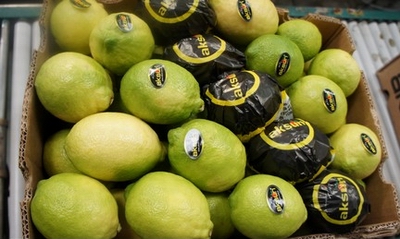“Last year we only exported about 100 containers of lemons to Asia,” said Akin Soyleyen, international trade coordinator for AKSUN in Asia. “But this season, if everything goes well, we'll ship about 300 containers to Asia by the time the season ends in April.” Bad weather last year led to low production, and the resulting scarcity of lemons in Turkey, where lemons are in high demand, made for high domestic prices. That meant that exporters could only sell their fruit at prices higher than those which could be found on the domestic market, and those conditions led to low sales.

“We've also had the opportunity to ship more fruit to Hong Kong this year,” said Soyleyen. “The Chinese market is usually hard to get into, they are really cheap and their transit times are really low compared to overseas suppliers like us, but lower production there has meant we're able to ship more lemons to Hong Kong.” Increased demand and sufficient supplies with which to meet that demand has meant improved sales. In fact, Soyleyen estimated that AKSUN's sales in Hong Kong, Singapore and Malaysia, AKSUN's major markets in Asia, have increased by over 100 percent over last season's sales. Part of that is due to a quick end to the South African season. With less South African fruit competing with Turkish exports, Turkish exporters can set the prices in Asia. Those advantages are very much appreciated by Soyleyen, who noted that Turkish exporters wishing to export fruit to Asia have several factors working against them.
“It takes about 23 days for us to ship fruit from Turkey to Singapore, and it takes about two weeks for Egyptian fruit to make it there, so we're at a disadvantage there,” said Soyleyen. The response time for fruit business is very important and so is the transit time. The market prices change everyday and customers rightfully don’t want to take any risks, which are more common with longer transit times. “The Asian market is also very big, so there are many importers, and it's important to find the right ones to work with.”
But for Soyleyen, the opportunities in Asia are well worth the problems they have to overcome. Though it's been hard establishing their brands reputation in the market throughout the five years they've been there, Soyleyen said it's easier to gain a foothold in Asia than in Europe. While the barriers to entry are lower in Europe, it's actually the discerning nature of Asian buyers that has given AKSUN a leg up in Asia.
“If buyers and consumers in Asia like you, like your product and they think your product will sell, they will stick with you,” said Soyleyen. “So it's been easy for us to develop our product because we did a good job with quality and we did a good job developing sales channels, so it's been going well for us, and we believe we will do better in the years to come.”







